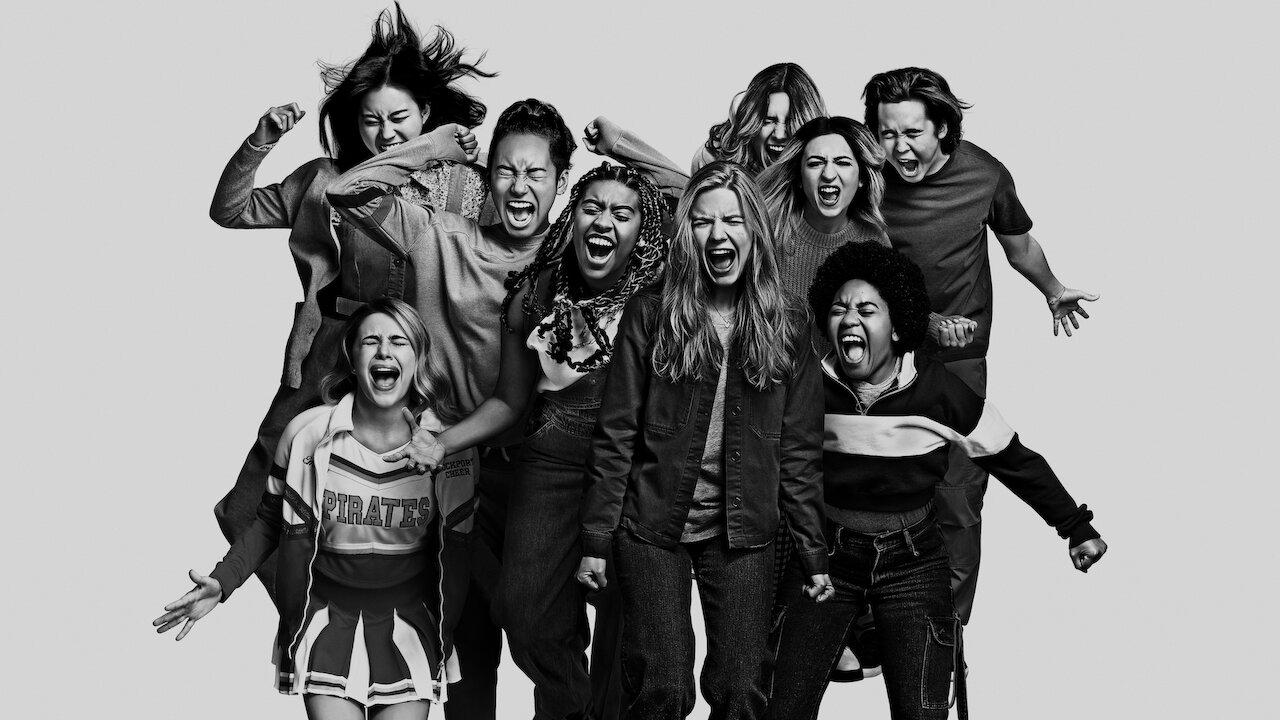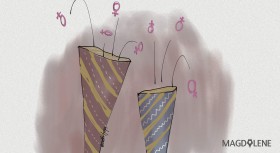Up until a third of the way in the movie, I didn’t think Moxie was all that great. Don’t get me wrong, it was a breeze to watch especially after a long day of meetings and working (from home). It wasn’t a great movie though. The characters weren’t all fleshed out, the writing was cliched, and in some parts, even lazy. I wouldn’t call it a disappointment because I did enjoy it, however, it definitely wasn’t the revolutionary teen feminist movie people had expected it to be.
But something happened about a third of the way into the movie that made me want to forgive Moxie for all its failings. Vivian, the main character, was in the school bathroom somewhat sulking because her revolution wasn’t going as planned when she found an anonymous note addressed to Moxie, the feminist zine (and subsequent club) she had started. The note was written by a girl in school who alleged that Mitchell Wilson, their school’s reigning Asshole King had raped her and she had stayed silent about it because she didn’t know what to do. After seeing how Moxie banded the girls (along with some woke, feminist boys) in school together, she found enough courage to write the note asking for their help.
Also read: Dear Film and TV Producers: My Sexual Assault Is Not Your Plot-Advancing Device
It was that moment when Moxie, to me, shifted from being a cliched, oblivious, oft-stumbling, teen movie to an earnest, albeit uneven and somewhat incoherent attempt at understanding what it means to be a teenage girl in a world that is supposedly “woke” but at the same time, seems to be going backwards. The moment when the protagonist of the movie, Vivian, reads that anonymous note, it’s apparent that she finally understands what feminism means. It isn’t just about “girl power” and being able to wear what we want or even about being “angry”. It’s about standing up for the girl who wrote that anonymous note. It’s about making sure no other girl needs to write the same note because they feel powerless and voiceless.
Vivian started Moxie, a feminist zine anonymously distributed in the school bathrooms, because she was fed up with the blatant misogyny happening every single day in her school and how it was casually accepted as the norm, even by her and her best friend Claudia. It took one new girl, Afro-Latina Lucy, to stand up to the harassment and bullying that have been normalized for so long, for Vivian to realize that it shouldn’t be that way and that she should do something about it.

I made a joke on my IG story that Moxie is like Magdalene, but in high school, which Hera Diani – the managing editor - found funny. There’s some truth to it, though. I hadn’t known Hera and Devi yet when they first founded Magdalene way back in 2013 so I never really knew what made them decide to start an online feminist magazine in Indonesia, of all places. But I think in a way, they too had their “rebel girl” moment. As journalists in highly respected publications, they both have countless stories to tell about misogyny, sexism, sexual harassment, and yes, even assault, that is often normalized and accepted as the norm. That’s just the way it is. I’d like to think the anger and frustration that drove Vivian to create Moxie was the same fuel that started Magdalene back then, and the fuel that’s going to keep it going.
In Moxie, even though Vivian first created the zine to support her friend Lucy who was being harassed by none other than resident douchebag rapist Mitchell Wilson, it ends up amplifying the voices that were not previously heard. Lucy’s voice was already heard loud and clear when she refused to accept the “boys will be boys” dismissal to Mitchell’s misogyny. But because of Moxie, other voices are also heard. From Kiera, the underappreciated soccer star, to Kaitlynn, the girl who gets sent home for wearing a tank top, and finally, to the girl who wrote the note (I will not divulge the identity here so as not to spoil the movie).
Also read: 'Bridgerton': The Soapy, Corny, Horny Romantic Hero That Saves 2020
I think what we often forget, in the hullabaloo of Twitter wars and cyber-attacks that Magdalene has had to endure these past few years, is that publications like Magdalene exist to give a voice to women whose voices were unheard, ignored, or dismissed. It doesn’t matter if you don’t like some of the articles published. Publications like Magdalene aren’t here to validate your opinions. They exist to give a voice and provide a safe space for those who have been silent for too long.
Another thing I like about the movie is how it ended (forget about the dance party closing credit). It feels a bit unfinished. We aren’t told what happened to Mitchell after the girl shared the story in public. We are only given a scene where the principal called on Mitchell but whether or not there were real consequences were never explained. We aren’t even given a glimpse of what happened to Moxie after. Did it work? Did the revolution change anything? Does Kiera finally get the $10,000 scholarship? Moxie never really wraps anything up, but I think it ends that way for a reason. I think it’s because we’re nowhere near done with the revolution. We’re still right in the thick of it, and for some of us, it’s only just begun. Vive la révolution.







Comments